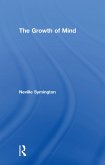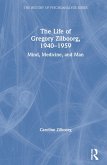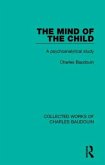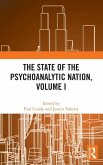The Omnipotent State of Mind
Psychoanalytic Perspectives
Herausgeber: Arundale, Jean
The Omnipotent State of Mind
Psychoanalytic Perspectives
Herausgeber: Arundale, Jean
- Gebundenes Buch
- Merkliste
- Auf die Merkliste
- Bewerten Bewerten
- Teilen
- Produkt teilen
- Produkterinnerung
- Produkterinnerung
This book presents an examination and exploration of the concept of omnipotence, its qualities and expression as a psychic state, its origins in the psyche and its appearance in the psychoanalytic process and in society.
Andere Kunden interessierten sich auch für
![A Couple State of Mind A Couple State of Mind]() Mary MorganA Couple State of Mind159,99 €
Mary MorganA Couple State of Mind159,99 €![The Growth of Mind The Growth of Mind]() Neville SymingtonThe Growth of Mind139,99 €
Neville SymingtonThe Growth of Mind139,99 €![The Life of Gregory Zilboorg, 1940-1959 The Life of Gregory Zilboorg, 1940-1959]() Caroline ZilboorgThe Life of Gregory Zilboorg, 1940-1959159,99 €
Caroline ZilboorgThe Life of Gregory Zilboorg, 1940-1959159,99 €![The Mind of the Child The Mind of the Child]() Charles BaudouinThe Mind of the Child168,99 €
Charles BaudouinThe Mind of the Child168,99 €![The Life of Gregory Zilboorg, 1890-1940 The Life of Gregory Zilboorg, 1890-1940]() Caroline ZilboorgThe Life of Gregory Zilboorg, 1890-1940159,99 €
Caroline ZilboorgThe Life of Gregory Zilboorg, 1890-1940159,99 €![The State of the Psychoanalytic Nation, Volume I The State of the Psychoanalytic Nation, Volume I]() The State of the Psychoanalytic Nation, Volume I158,99 €
The State of the Psychoanalytic Nation, Volume I158,99 €![The Mindbrain and Dreams The Mindbrain and Dreams]() Mark J. BlechnerThe Mindbrain and Dreams159,99 €
Mark J. BlechnerThe Mindbrain and Dreams159,99 €-
-
-
This book presents an examination and exploration of the concept of omnipotence, its qualities and expression as a psychic state, its origins in the psyche and its appearance in the psychoanalytic process and in society.
Produktdetails
- Produktdetails
- Verlag: Routledge
- Seitenzahl: 258
- Erscheinungstermin: 23. Juni 2022
- Englisch
- Abmessung: 240mm x 161mm x 19mm
- Gewicht: 555g
- ISBN-13: 9781032027937
- ISBN-10: 1032027932
- Artikelnr.: 63197840
- Herstellerkennzeichnung
- Libri GmbH
- Europaallee 1
- 36244 Bad Hersfeld
- gpsr@libri.de
- Verlag: Routledge
- Seitenzahl: 258
- Erscheinungstermin: 23. Juni 2022
- Englisch
- Abmessung: 240mm x 161mm x 19mm
- Gewicht: 555g
- ISBN-13: 9781032027937
- ISBN-10: 1032027932
- Artikelnr.: 63197840
- Herstellerkennzeichnung
- Libri GmbH
- Europaallee 1
- 36244 Bad Hersfeld
- gpsr@libri.de
Jean Arundale, PhD, is a training and supervising analyst of the British Psychoanalytic Association and author of the book Identity, Narcissism, and the Other (Routledge). She is also co-editor of Transference and Countertransference and Interpretive Voices (both Routledge).
Introduction In the beginning . . . 1. The survival function of primitive
omnipotence 2. The thumb-in-the-mouth phantasy and the capacity to love 3.
Peter Pan, the omnipotent child In the adolescent . . . 4. Omnipotence in
adolescence 5. Customising the body: From omnipotence to autonomy In the
adult . . . 6. On three forms of thinking: Magical thinking, dream
thinking, and transformative thinking 7. The appeal of omnipotence 8. A
neuropsychoanalytic note on omnipotence 9. The relinquishment of
omnipotence in a severely traumatised patient 10. Possessed by a cruel God:
The damaging effect of an omnipotent internal object 11. From patients to
presidents: The Grand Illusion Why is omnipotence so difficult to give up?
12. Overcoming obstacles in analysis: Is it possible to relinquish
omnipotence and accept receptive femininity? 13. Omnipotence and the
difficulty in relinquishing it The desire for power in culture and society
. . . 14. Omnipotence and the paradoxes of insight: A Darwinian look 15.
Lear, Kane and the workings of omnipotence 16. Applying my theory of
psychosis to the Nazi phenomenon 17. The destructiveness of omnipotence and
'perverted containing': Psychoanalytic reflections on the dynamic between
Donald Trump and his supporters 18. Notes toward a model for omnipotence
omnipotence 2. The thumb-in-the-mouth phantasy and the capacity to love 3.
Peter Pan, the omnipotent child In the adolescent . . . 4. Omnipotence in
adolescence 5. Customising the body: From omnipotence to autonomy In the
adult . . . 6. On three forms of thinking: Magical thinking, dream
thinking, and transformative thinking 7. The appeal of omnipotence 8. A
neuropsychoanalytic note on omnipotence 9. The relinquishment of
omnipotence in a severely traumatised patient 10. Possessed by a cruel God:
The damaging effect of an omnipotent internal object 11. From patients to
presidents: The Grand Illusion Why is omnipotence so difficult to give up?
12. Overcoming obstacles in analysis: Is it possible to relinquish
omnipotence and accept receptive femininity? 13. Omnipotence and the
difficulty in relinquishing it The desire for power in culture and society
. . . 14. Omnipotence and the paradoxes of insight: A Darwinian look 15.
Lear, Kane and the workings of omnipotence 16. Applying my theory of
psychosis to the Nazi phenomenon 17. The destructiveness of omnipotence and
'perverted containing': Psychoanalytic reflections on the dynamic between
Donald Trump and his supporters 18. Notes toward a model for omnipotence
Introduction In the beginning . . . 1. The survival function of primitive
omnipotence 2. The thumb-in-the-mouth phantasy and the capacity to love 3.
Peter Pan, the omnipotent child In the adolescent . . . 4. Omnipotence in
adolescence 5. Customising the body: From omnipotence to autonomy In the
adult . . . 6. On three forms of thinking: Magical thinking, dream
thinking, and transformative thinking 7. The appeal of omnipotence 8. A
neuropsychoanalytic note on omnipotence 9. The relinquishment of
omnipotence in a severely traumatised patient 10. Possessed by a cruel God:
The damaging effect of an omnipotent internal object 11. From patients to
presidents: The Grand Illusion Why is omnipotence so difficult to give up?
12. Overcoming obstacles in analysis: Is it possible to relinquish
omnipotence and accept receptive femininity? 13. Omnipotence and the
difficulty in relinquishing it The desire for power in culture and society
. . . 14. Omnipotence and the paradoxes of insight: A Darwinian look 15.
Lear, Kane and the workings of omnipotence 16. Applying my theory of
psychosis to the Nazi phenomenon 17. The destructiveness of omnipotence and
'perverted containing': Psychoanalytic reflections on the dynamic between
Donald Trump and his supporters 18. Notes toward a model for omnipotence
omnipotence 2. The thumb-in-the-mouth phantasy and the capacity to love 3.
Peter Pan, the omnipotent child In the adolescent . . . 4. Omnipotence in
adolescence 5. Customising the body: From omnipotence to autonomy In the
adult . . . 6. On three forms of thinking: Magical thinking, dream
thinking, and transformative thinking 7. The appeal of omnipotence 8. A
neuropsychoanalytic note on omnipotence 9. The relinquishment of
omnipotence in a severely traumatised patient 10. Possessed by a cruel God:
The damaging effect of an omnipotent internal object 11. From patients to
presidents: The Grand Illusion Why is omnipotence so difficult to give up?
12. Overcoming obstacles in analysis: Is it possible to relinquish
omnipotence and accept receptive femininity? 13. Omnipotence and the
difficulty in relinquishing it The desire for power in culture and society
. . . 14. Omnipotence and the paradoxes of insight: A Darwinian look 15.
Lear, Kane and the workings of omnipotence 16. Applying my theory of
psychosis to the Nazi phenomenon 17. The destructiveness of omnipotence and
'perverted containing': Psychoanalytic reflections on the dynamic between
Donald Trump and his supporters 18. Notes toward a model for omnipotence








